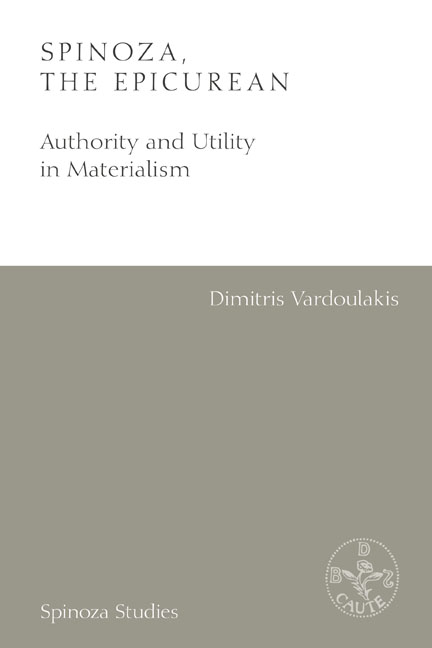Book contents
- Frontmatter
- Contents
- Reference Guide to Spinoza’s Work
- Acknowledgements
- Dedication
- Preamble
- Introduction: Why is Spinoza an Epicurean?
- 1 Freedom as Overcoming the Fear of Death: The Dialectic of Authority and Utility in the Preface
- 2 The Power of Error: Moses, the Prophets and the People (chapters 1, 2 and 3)
- 3 Philonomianism: Law and the Origin of Finitude (chapter 4)
- 4 Political Monism: The Primacy of Utility over Authority (chapters 5 and 6)
- 5 Love your Friend as Yourself: The Neighbour and the Politics of Biblical Hermeneutics (chapters 7 to 13)
- 6 The Freedom to Philosophize: The Two Paths to Virtue (chapters 14 and 15)
- 7 Fear and Power: Natural Right and Authorization in Spinoza and Hobbes (chapter 16)
- 8 Theocracy: On the State of Authority (chapters 17 and 18)
- 9 The Authority to Abrogate: The Two Paths to Virtue and the Internal Enemy (chapters 19 and 20)
- Conclusion: The Limitation of Spinoza’s Epicureanism
- Bibliography
- Index
5 - Love your Friend as Yourself: The Neighbour and the Politics of Biblical Hermeneutics (chapters 7 to 13)
Published online by Cambridge University Press: 20 October 2020
- Frontmatter
- Contents
- Reference Guide to Spinoza’s Work
- Acknowledgements
- Dedication
- Preamble
- Introduction: Why is Spinoza an Epicurean?
- 1 Freedom as Overcoming the Fear of Death: The Dialectic of Authority and Utility in the Preface
- 2 The Power of Error: Moses, the Prophets and the People (chapters 1, 2 and 3)
- 3 Philonomianism: Law and the Origin of Finitude (chapter 4)
- 4 Political Monism: The Primacy of Utility over Authority (chapters 5 and 6)
- 5 Love your Friend as Yourself: The Neighbour and the Politics of Biblical Hermeneutics (chapters 7 to 13)
- 6 The Freedom to Philosophize: The Two Paths to Virtue (chapters 14 and 15)
- 7 Fear and Power: Natural Right and Authorization in Spinoza and Hobbes (chapter 16)
- 8 Theocracy: On the State of Authority (chapters 17 and 18)
- 9 The Authority to Abrogate: The Two Paths to Virtue and the Internal Enemy (chapters 19 and 20)
- Conclusion: The Limitation of Spinoza’s Epicureanism
- Bibliography
- Index
Summary
The first part of the Theological Political Treatise is concerned with the genesis of personal authority exemplified by the prophets, who are defined in terms of the communication they effect. Theirs is a one-way communication through revelation: they interpret God's message for the people. But their authority is premised on a series of errors that also permeate the conceptions of identity of the people and the source of legality. Spinoza structures the second part of the Treatise by explaining how the errors that underlie the personal authority of the prophets are overcome.
This does not mean that Spinoza rejects authority as such. Rather, he develops a new notion of authority. This new notion of authority is informed by changes brought forward by the Reformation when authority's relation to communication shifts from the person – such as the absolute authority of the Pope to interpret Scripture – to the authority of Scripture itself, or sola Scriptura. The changed conditions about interpretation in the aftermath of the Reformation influence the notion of authority. I call this authority that is created in conjunction with hermeneutics Reformed authority.
It would be deficient, however, to resolve the intricacy of Spinoza's argument with reference solely to the historical context. Reformed authority is situated within the argumentative structure of the Theological Political Treatise. The notion of neighbourly love is pivotal in the Treatise's presentation of authority. In chapters 7 to 13, Spinoza returns three times to neighbourly love, mobilizing it in such a way as to function as the cypher of his conception of Reformed authority. The key to this conception, as it is exemplified by the first use, is that Reformed authority overcomes the distinctive error of the prophets in the course of establishing their own authority – namely, the error of imagining God as a ruler and lawgiver or ascribing potestas to the divine. Reformed authority no longer relies on a transcendent source to prop itself up. Rather, it relies on reason and as such it is an authority whose function is to teach; it is a didactic authority, as Spinoza calls it.
- Type
- Chapter
- Information
- Spinoza, the EpicureanAuthority and Utility in Materialism, pp. 172 - 202Publisher: Edinburgh University PressPrint publication year: 2020



